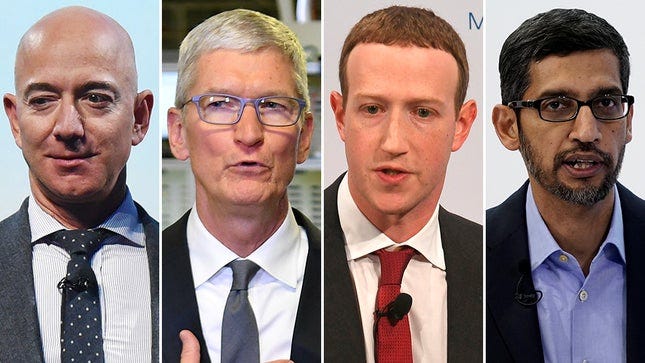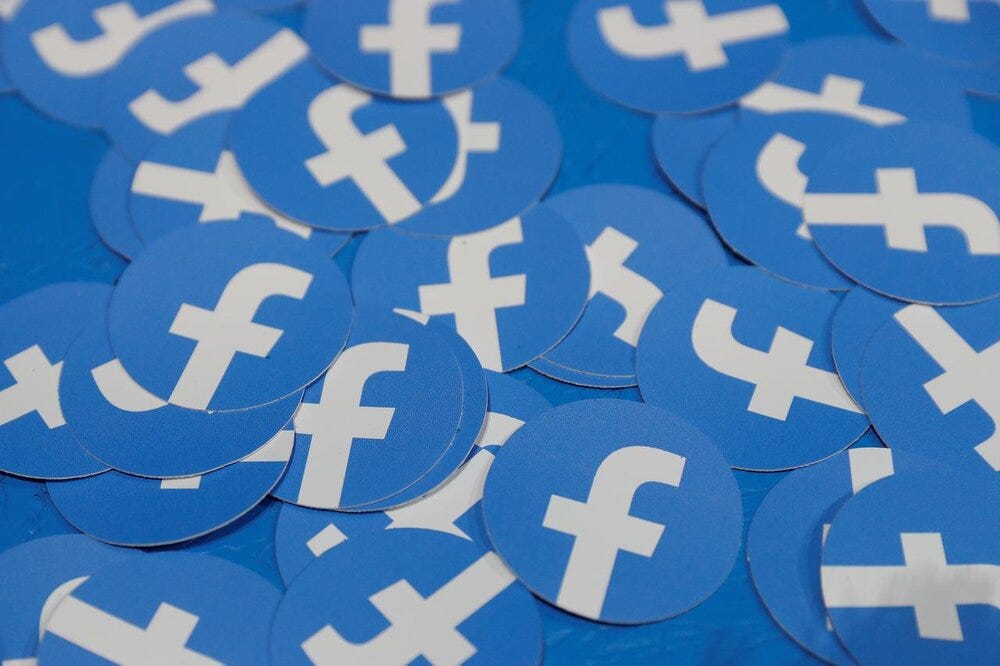He’s gotta go
In this week‘s newsletter: Why Donald T**** shouldn’t get perks entitled to most former presidents. Plus: How to choose which creative project to focus on when you have several ideas.
Prior to the attempted insurrection by a mob of T**** supporters last week, I was vaguely aware that former presidents were entitled to lifetime Secret Service protection. But it wasn‘t until a few days ago when I realized there‘s actually a law on the books that authorizes additional lifetime benefits to former commanders-in-chief. It‘s called the Former Presidents Act and it provides an annual pension of $219,200 that begins immediately after a president‘s departure from office, seven months of transition funding for the expenses of leaving office, funding to pay a private office staff, medical treatment in military hospitals and the aforementioned Secret Service protection. There‘s a not-so-small caveat though: These entitlements only apply if the former president was not removed from office by impeachment or other Congressional actions.
We‘re 24 hours removed from the T****‘s second impeachment and although we‘re still unsure if enough Senate Republicans will vote to convict him of incitement of insurrection, I felt bad for a few days for hoping he defaulted on the post-presidency perks that most of his predecessors have enjoyed. But then I realized that he is undeserving of them. And if it‘s the taxpayers who are expected to foot the bill, then we should have a say in who gets those dollars. I‘m as ready as anyone to turn the page on this hideous chapter in our nation‘s history, but a new day requires us to hold the powerful to account for the decisions and behavior that got us here. That‘s why T**** must go.
What I Wrote This Week

It’s dangerous to think of business leaders as politicians: A reporter recently suggested that CEOs have become the “fourth branch of government.” But this mischaracterization ignores the fact that executives are fiduciaries to their shareholders, not representatives of tax-paying constituents.
I acknowledge that people feel a deep distrust towards the government and the media and often look to business leaders to fill the void. New data from the Edelman Trust Barometer reports that trust has fallen to historical lows across media, government, business and NGOs and that business is the only institution that is now perceived as being both ethical and competent enough to solve the world's problems. Things are so dire Edelman has declared “information bankruptcy.” So it should come as no surprise then that CEOs are the only societal leaders trusted to tell the truth and fix problems. But repeat after me: The CEOs won’t save us. In fact, they are core contributors to a lot of the economic and social inequities that ails us right now. And although the same can be said about a fair share of our elected officials, surrendering more power to tech executives is an insufficient remedy for restoring trust in our democracy and media institutions no matter how dysfunctional our government is at the moment.
Miya Ponsetto can‘t have it both ways: Soho Karen's dangerous performance of white victimhood against a Black teenager last month didn't work. So now she's the one playing the race card.
Ponsetto reflects the worst kind of ”person of color“: Those who want both the perceived cultural cache that comes with identifying as nonwhite while performing a brand of whiteness that protects them from the violence and pain marginalized communities experience at the hands of white supremacy. This is the same critique leveled against the Kardashians. There‘s even a term for this behavior: Blackfishing. “It‘s about picking and choosing common Black traits and characteristics for one‘s benefit,“ Johanna Yaovi, founder of The Curl Talk Project, said to Priya Elan at The Guardian last April. “As Black women, we are constantly fighting for clear, authentic representation and diversity and then have to face individuals who do Blackfishing, individuals who will therefore look ambiguous enough for brands to use them as emblems for diversity.“ In Ponsetto‘s case, she compares her trauma to that of a Black father and son who not only could have been killed by a trigger-happy cop or vigilante bystander but also would not have been believed without video evidence. She just didn‘t want her phone back. She wanted to punish Harrold and his son for an offense her racism made up in her head. And she weaponized her proximity to whiteness because she believed it would make them pay.
The right’s desire for unity is not my burden to carry: What Republican leaders are too cowardly to say is that their brand of unity is actually just a euphemism of unchecked authority and unaccountability.
But many of the same politicians and pundits prodding us to stand in solidarity with them are unwilling to acknowledge on the record that their voter fraud claims, which have been repeatedly deemed bogus by the courts, are false and that Biden won free and fair. These are people who think that triggering the worst impulses of rabid partisans is an accelerant for their political ambitions. These are people who literally attempted to disenfranchise millions of voters — with support from a conservative media ecosystem and tech executives whose tools were exploited at democracy‘s expense. These are people who prefer voter suppression over ballot access. These are people who antagonized peaceful protestors and grieving families with harmful rhetoric and legislative inaction last summer. These are people who lack the integrity to tell the truth about our country‘s racist founding, in which it was seen as a compromise to view my ancestors as three-fifths of a human. I‘m under no obligation to honor their calls of unity when they're in disservice to my best interests or those of the communities I represent.
For all access to these and future essays on the intersection of creativity and the new economy, subscribe to The Supercreator. Already a subscriber? Log in to your account.
Thoughts and Things
From headaches to back pain, the pandemic is doing a number on our bodies.
This book, which I‘ll be finishing in between NFL playoff games this weekend, is a fascinating rejection of the idea that we‘re not working or learning hard enough.
As we debate if the Biden administration should cancel student-loan debt, it's also worthwhile to look at how to reduce the hidden costs of college for future gens.
A simple message of affirmation every time you walk into your bathroom.
Grab some tissues before you read about the grief of families with loved ones suffering behind bars as the coronavirus sweeps through our nation‘s prisons.
Please look the other way as I add another black crewneck sweatshirt to my shopping cart. 🙈
Events
Next Tuesday (1/19) at 8 p.m. EST, Keomi Tarver — friend of The Supercreator and founder of abundance with Keo, a movement-based wellness brand — is teaming up with Nordstrom and Outdoor voices to facilitate a free 30-minute high-energy hip-hop dance class to get your body moving and endorphins pumping. “Inclusion is very important to me and I connected with OV on one of their common themes: Creating space for everyone,” Tarver said to The Supercreator. ”From the music to the movement, you can expect joy and space for full expression.“ RSVP to reserve your spot today.
Ask Michael
How do you choose which creative project to pursue when you have several ideas?
If the project is a hobby, then I do a simple “Joy Test” and pick the project or idea that I look forward to the most. But if it‘s for my business, then I rank ideas based on two factors: How many people say they'd be willing to pay for the idea if I sold it as a product, service or experience and if I can execute the idea at least one percent better than the best person or organization making and selling my idea. (You can assess your market‘s willingness to pay on in informal one-to-one conversations or via a survey with a tool like Typeform or Google Forms; when I was developing The Supercreator, I used both methods.)
I also like to set project milestones for ideas and let them dictate which ones I spend my creative energy on. For example, I have an idea for a book I‘d like to eventually propose and sell to a publisher. But if the book project were my focus right now, it would jeopardize this newsletter, which sustains my business and enables my flexible lifestyle. So I established a revenue and subscriber milestone last year that, once I reach it, will enable me to hire a literary agent, write a manuscript and promote the book without it costing my business.
Lastly, I adhere to the Pareto Principle, which asserts that 80 percent of the value you generate results from 20 percent of your creativity. Start by prioritizing the 20 percent of ideas that will produce the best results based on your personal and professional vision. For example, if you have a list of five to 10 ideas, choose the best one or two to invest in and go from there. Hope this helps!
Have a question about how to make, brand, market and sell with confidence and clarity? Reply to this email or leave a comment below and it may be featured in an upcoming post.
From the Archive
Facebook indefinitely kicked Donald T**** off its family of apps after he incited last week‘s insurrection. But as Greg Bensinger at The New York Times wrote, “These companies have consistently ignored warnings about how their very structure foments misinformation and division. A Facebook-ordered civil rights audit in July effectively gave the company a failing grade.” I echoed similar sentiments in the wake of the civil unrest in Kenosha, Wisconsin last summer: **With Facebook, it‘s always too little too late (published on 9/3/20):**
Facebook didn’t create racism and isn’t the only social app that enables disinformation at scale — but it’s the biggest app and the jagged enforcement of its own policies leaves it vulnerable to the unsparing critiques it’s often on the receiving end of. Zuckerberg’s credulous obsession with “free expression” is so worthy in his eyes that who cares if it has normalized what [political journalist Judd] Legum calls “the conspiracy spin cycle?” This can be explained by Zuckerberg’s righteous belief that the remedy to bad speech is more speech, no matter the harm it may cause. “Ultimately, accountability for those in positions of power can only happen when their speech is scrutinized out in the open,” Zuckerberg wrote earlier this summer. My response: ”Spoken like someone who’s never had to endure the trauma of seeing their people’s humanity constantly questioned or stolen ‘out in the open.’“
FYI: Subscribers enjoy on-demand access to the full archive of posts featuring original reporting, rich storytelling and smart product recommendations.
Thanks to you for reading and to the paying subscribers who make free posts like these possible. If you were forwarded this message, sign up to get future posts sent directly to your inbox. And if you enjoy this newsletter, please share it with a friend or five. See you next week!






